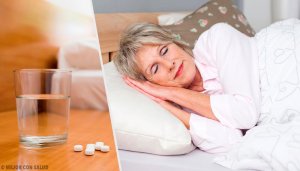Risks and Side Effects of Sleeping Pills

In this stressed and overwhelmed society riddled with insomnia, sleeping pills are all the trend.
The World Health Organization (WHO) is amazed by these statistics, but few people understand the negative effects generated by the use and abuse of these drugs.
Using sleeping pills is risky and has counterproductive consequences.
Depression and High Blood Pressure
Some time ago, Mayo Clinic alerted the world’s population about the harmful effects of consuming sleeping pills.
Through an official statement, the institution said that these products can lead to depression and high blood pressure.
- More surprising was the fact that they stated that this type of medical solution could cause chronic pain in some patients.
- Dizziness and uncontrolled drowsiness and lightheadedness are other negative consequences of the use of these drugs.
For these reasons, the medical institution recommended conducting thorough checkups on patients who were suffering from some insomnia-related pathology.
Take a look at this article: Music Therapy Can Help Lower High Blood Pressure
Elderly Patients, Beware

We all can suffer from the side effects of sleeping pills, but senior citizens should be extra careful while taking them.
Some symptoms, such as dizziness or drowsiness, may have a greater impact on this population.
Senior citizens who use these drugs have a higher risk of falling and suffering from dangerous rises in blood pressure.
In addition, from age 65, the human body begins to gradually lose the ability to tolerate these drugs.
An older body decomposes and discards these medicines more slowly. For this reason, the effect of the sleeping pills could last longer than expected.
Sleeping Pills Generate Addiction
Many of these sleeping pills have an addictive effect on patients.
Also, their regular use buids up a tolerance and this, in turn, generates the need to opt for higher doses.
In some cases, insomniacs become dependent on these products to be able to sleep. This is an unnatural situation that is negative for patients.
Therefore, you should only use them sporadically and temporarily for the sole purpose of treating specific crises.
It’s obvious that their purpose isn’t to permanently substitute the normal sleeping process.
Beware of Car Accidents

Abuse of alcohol and illegal drugs is not the only cause of car accidents. In fact, it was discovered that many of the unfortunate incidents that occur on public roads are caused by sleeping pills.
The problem is that the drowsiness doesn’t go away when it should. Some people may even experience blurred vision and this makes it difficult to properly measure distances between cars.
Driving is an activity that requires the active participation of all the senses in an optimal state. Unfortunately, there are cases of drivers who have fallen asleep at the wheel.
See also: 6 Signs of an Alcohol Addiction
Risk of Premature Death
According to a compilation of studies carried out in 2016, the use of sedatives may be related to premature deaths.
The comparative study found that the risk increases in higher doses.
The patients that were studied used drugs such as temazepam, eszopiclone, and zaleplon. Barbiturates and antihistamines that cause drowsiness were also considered in this study.
In addition, the study also warns that their use could enhance the development of some cancers.
Beware of Sleeping Pills

Also, some formulas can produce severe depression and anxiety. Every person and body is different and not all people react the same way to certain drugs.
The most worrisome aspect is that there’s a whole bunch of over-the-counter drugs available to anyone.
It’s very important to see a health professional that can conduct rigorous tests. These tests will diagnose the patient and prescribe a prescription for appropriate medications and dosages.
https://steptohealth.com/the-best-natural-sleeping-aids/
All cited sources were thoroughly reviewed by our team to ensure their quality, reliability, currency, and validity. The bibliography of this article was considered reliable and of academic or scientific accuracy.
- Pagel, J. F. (2005). Medications and their effects on sleep. Primary Care – Clinics in Office Practice. https://doi.org/10.1016/j.pop.2005.02.009
- Ramsin B, Trescot, A. M., Datta, S., Buenaventura, R., Adlaka, R., Sehgal, N., … Vallejo, R. (2008). Opioid complications and side effects. Pain Physician. https://doi.org/11:S105-S120
- Psychotropic Expert Group. Insomnia, parasomnias and jet lag (Revised June 2013). Psychotropic version 7, 2013 Therapeutic Guidelines Ltd 2014. [eTG online] (accessed 21 January 2018)
- NHS Choices. Insomnia. England, UK: NHS England, 2013. [Online] (accessed 21 January 2018).
- Sleep Health Foundation. Ageing and sleep. Sydney, Australia: Sleep Health Foundation, 2011 (Updated December 2014). [Online] (accessed 21 January 2018)
- Sleep Health Foundation. Insomnia. Sydney Australia: Sleep Health Foundation, 2011 (Updated March 2015). [Online] (accessed 21 January 2018)
This text is provided for informational purposes only and does not replace consultation with a professional. If in doubt, consult your specialist.








